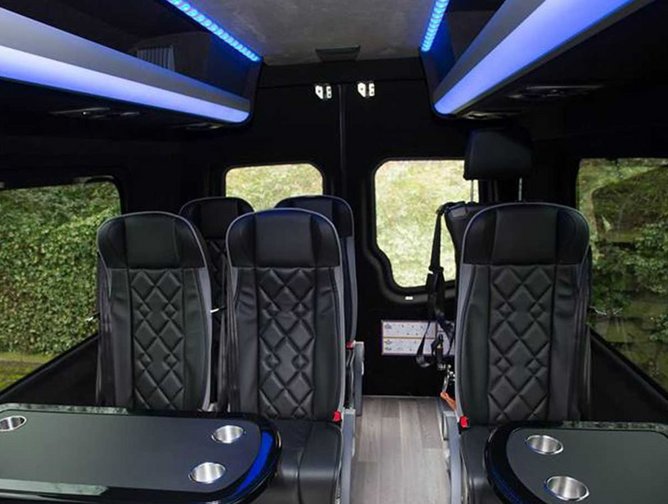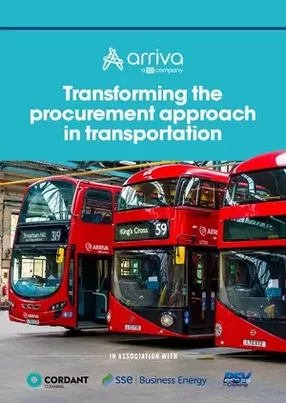Arriva UK Bus: transforming the procurement approach in transportation
With a drive to deliver value-adding innovative procurement and supply chain solutions, Arriva UK Bus harbours clear procurement transformational goals in the supply chain space.
Ian Jones, Head of Procurement at Arriva UK Bus, oversees the company’s procurement strategy and believes that sustainable long-term improvement within procurement and the wider supply chain is fundamental for success. “Over the past five years, we’ve really focused on transformation. When I first joined Arriva, there was a centralised procurement team in its infancy and a regionalised purchasing function,” he explains. He commenced building a synergised category management procurement team with supporting programme management, data extraction and categorisation underpinned with proactive analytics. “All the transactional activity was undertaken in five regions, each with their own purchasing team,” says Jones. “However, we felt we could achieve more leverage, control and compliance by centralising all activity through one location, harnessing the power of strategic procurement in collaboration with purchasing. By implementing that, it enabled us to drive spend to first and second tier suppliers because of the control from the central location.”
Prior to Jones’ tenure, Arriva UK Bus operated with five regions all creating Purchase Orders (POs). However, since switching to its centralised purchasing approach, Jones acknowledges its influence and believes it has enhanced efficiency significantly. “Our current approach drives process efficiency and we’re consolidating POs, providing greater ability to expedite,” explains Jones. “By communicating with the supply base instead of sending multiple POs at different times of the day, we can drive supply chain efficiencies via defined order cut off times which provides the opportunity for greater organisational alignment and ensuring resource availability at optimal times. The supplier then has the ability to pick for the consolidated order and then sub-pack, rather than pick, pack and dispatch on multiple occasions.”
As part of Arriva’s procurement transformation journey, the first step was to get the right procurement environment in place. This meant a focus on people, data, holistic spend management, process and policy. Secondly, Arriva looked at the purchasing side of the organisation before finally considering further supply chain optimisation. Jones believes that establishing these core first steps was essential to laying the groundwork for his company’s transformation journey to succeed. “To us, it’s all about the why and how strategy. The first thing we did was develop a why. We took inspiration from Simon Sinek, and we aligned our mantra with his. His reasoning was that organisations and people that understand their ‘why’ are very successful,” explains Jones. “People in procurement can often give you the what, which is the delivery. However, they often scratch their heads on the why and the how. We’ve developed that why and how and linked it to the business’s strategic pillars. There’s been lots of work and this is ongoing to develop category managers and help them acquire softer skills to aid in the transition towards our strategic contract management programme as it’s linked to our journey through the stages of the procurement maturity curve.” Jones believes that strategic contract management is a core component to optimising the supply chain in order to better understand supply chain performance and manage risk. “The way to do that is by managing contracts in the right way and talking about innovation,” he says. “Our journey isn’t at an end yet; it’s fix and fly. The plane is in the air and you’re fixing it as you go — we haven’t stopped, we continue to deliver value for the organisation.”
With technology becoming increasingly influential to operations in the supply chain space, Jones believes that procurement and purchasing teams can’t operate effectively without harnessing data efficiently. “We’ve developed a range of in-house bespoke solutions in terms of technology,” says Jones. “We have a data scientist who has helped us develop these solutions. We operate a comprehensive project tracking tool, running circa 100 projects every year. This supports programme management, business communications, financial reporting and automated MI. It’s a key conduit between finance and procurement portraying the breakdown of the value that’s delivered by region.” Such bespoke equipment includes a sophisticated spend categorisation tool and an engineering parts usage anomaly tracking tool. “The spend categorisation tool is intelligent enough to extract and categorise spend information from free text strings, from this we build automated MI dashboards that deliver pertinent spend information in a range of formats to support category management and the business. It’s extremely sophisticated,” explains Jones. “With our parts usage anomaly tool, it allows us to identify extraordinary usage of engineering spare parts within particular depots, vehicle types, and events relative to other depots, across various different views using statistical significance to three standard deviations. The objective is to examine these positive and negative ‘outliers’ using the various views available to ultimately establish if an efficiency opportunity exists. This enables all the standard questions to be taken out of the equation because fleets vary by volume, variant and specification.”
In a bid to provide the company with an added layer of control, procurement has also built a part number extraction tool. The tool provides us with the ability to ensure that parts are purchased from contracted suppliers, thus driving compliance and ensuring the right part and quality are delivered, this is in addition to other tools we utilise.“This tool is vital because safety is essential and this helps to ensure the first tier preferred suppliers secure the volume,” says Jones.
Arriva places considerable trust on its supplier relationships as it seeks to drive continual value, more than just transactional interactions. “This is the next stage of the transformation,” says Jones. “We have built a supplier contract management programme focused on 25 segmented suppliers. In order to achieve this, Arriva are working with suppliers such as Cordant Cleaning, PSV Glass and SSE in a bid to drive innovation, continuous improvement, enhanced quality and environmental standards. “We’re looking to work together with our partners on key initiatives,” says Jones. “For example, we have a big waste and recycling agenda and with Cordant being an extension of our business they can support us in further increasing our recycling volumes because lots of our recycling comes from vehicles. It’s about health and safety as well as corporate social responsibility. All of our supplier partnerships are important and we were proud to be the first major transport operator in the UK to purchase 100% renewable electricity from SSE Business energy.”
Looking to the future, Jones has a clear idea of what he anticipates the future of the supply chain space to look like. “The future will be about immediacy, with products delivered to locations just-in-time in a cost-effective and efficient manner through sophisticated technology,” he says. “The benchmark in the retail industry is set; people want things and they want them now. It’s the same for us - if we’ve got a vehicle off the road and we need a part, we want it sooner rather than later.” With ambitions on becoming the mobility partner of choice, Arriva strives for its customers, passengers, public transport authorities and partners to choose the firm every time because of its trust to deliver high-quality, reliable and sustainable services. “The environment is another significant area of interest. Over the next few years, we’re going to be continually assessing our fleet as the industry moves towards more zero or low emission vehicles or zones. That’s a key area of focus for us in 2020 and beyond.”


- Ian Jones
- Make your Bus StartTechnology & AI

